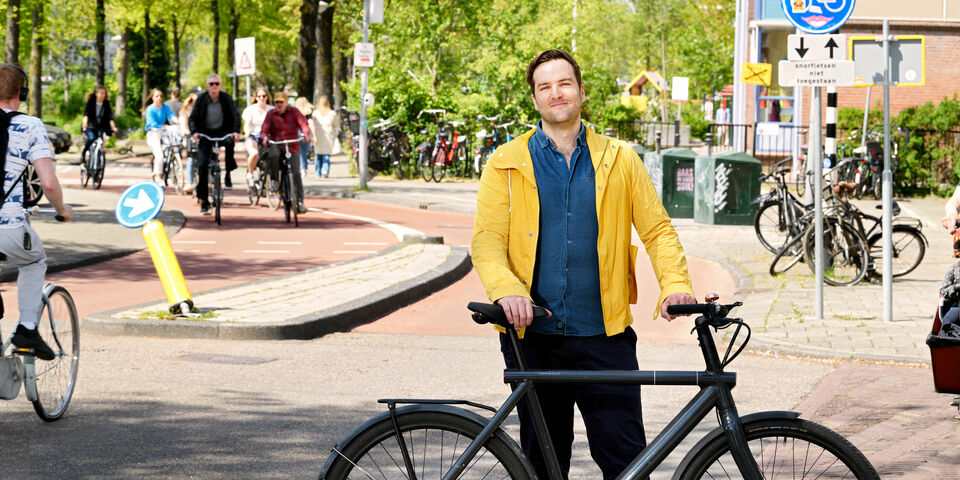Home Stretch | Make way for the cyclist
In Paris, car drivers are being required to make way en masse for cyclists. This has been inspired by Dutch cycling culture, says doctoral candidate (and bike activist) Brett Petzer. If it were up to this South African, cyclists and pedestrians everywhere would claim back the space now occupied by the car. “In urban planning, space is always automatically allocated to cars, while cyclists and pedestrians have to campaign for their rights. What a skewed situation.”
When Brett Petzer still lived in Cape Town, he was - like the rest of the white middle class there - used to getting around the city by car. But then a minor accident put his car out of commission and he had to switch to cycling. It was a revelation, he tells us. “The speed and convenience of cycling amazed me. I didn't need to look for parking spaces any more, for instance, and therefore I was always on time.” But he found it hard to persuade those around him of the benefits of cycling. “It's South African culture to go by car if you can afford it. So everyone thought I was cycling only because I no longer had a car.”
But as a means of urban transport the bike has a whole host of benefits: bikes emit no CO2 or poisonous exhaust fumes, make no din and pose a much lesser risk to their fellow road users than car drivers. Cycling is also healthy and cyclists take up much less space - something that particularly appeals to Petzer as a qualified urban planner. Isn't it odd that much of our public space is reserved for roads and car parks?, he says.
“And all the while pedestrians and cyclists have to fight their corner, even in a country like the Netherlands, rightly held up as an example due to its cycling culture. Someone once proposed that everyone be given a mobile square meter of public space for free; anything over and above that you have to pay for. Cycling would still be free, public transport should also be free, and for all the extra space they now occupy as a matter of course, drivers would have to pay.”
Cycling culture
At a summer school in Amsterdam in 2015, Petzer met TU/e professor Ruth Oldenziel, who is in charge of the research program Sustainable Urban Mobility. The South African was enthusiastic, and was appointed as a doctoral candidate working on the associated project ‘Bicycle Challenges’, which was right up his street. “This project, which has also led to a book, studies how the unique cycling culture of the Netherlands came about, and how we can help it lose its 'unique' tag.” In other words, how can the bike start playing a more important role elsewhere in the world as an environmentally friendly means of urban transport?
The Dutch situation didn't use to be at all exceptional, the PhD candidate points out. He has studied the conflicting interests inextricably linked with the (re-)planning of the urban space in cities. “It seems logical that the Dutch cycle culture came about because this is a small, densely populated and flat country. But for half a century, until the 1950s, cycling was very common in almost every city. London, Rome and Berlin no exception. But these cyclists were ousted by the advance of the car. In the Netherlands that advance was held back in the 1970s when it became clear that the number of urban traffic accident victims was increasing at an alarming rate, and many of them were children.”
Child murder
Under pressure from the - Eindhoven-born - campaign group Stop de Kindermoord (Stop the Child Murder) measures were quickly taken to restrict car traffic in Dutch cities and give cyclists more space. “In surrounding countries this backlash also occurred but was less successful. This is the main reason why the Netherlands serves as an example today.” So you could say that rather than being a modern phenomenon Dutch cycling culture is to some extent a relic of the past.
Looking to the future of sustainable urban transport, we should be thinking differently, believes Petzer, about how we divvy up our scarce public space between drivers, cyclists and pedestrians. “The battle for public space must become more equitable. Building roads for cars and only then looking to see where space is left for other users should stop being the default approach; save this for cases where the necessity for cars has been proven. This may mean we have to lose the obligatory parking spaces outside new buildings and that roads more often make way for cycle paths, instead of sidewalks being sacrificed for cycle lanes, as is still common in Amsterdam, where I live.” These issues now occupy Petzer, the happy owner of no fewer than four bikes, in his role as cycling consultant and lecturer at Utrecht University.
Petzer will get his PhD this Thursday at 1:30 PM.


Discussion